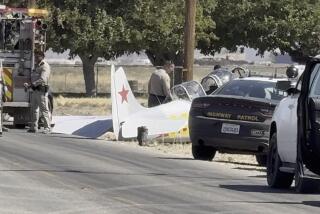Controllers in Airport Near-Miss of Two Planes Refuse to Be Tested
The controllers handling the jetliner and small plane that collided--or almost collided--as the big plane was taking off from Los Angeles International Airport on Wednesday have refused to take toxicological tests requested by National Transportation Safety Board investigators, the agency said Friday.
NTSB and Federal Aviation Administration officials have indicated that the Continental Airlines airliner and the twin-engine Cessna 310 apparently received conflicting instructions from airport tower controllers that put the two planes on a collision course.
The officials said the encounter occurred a few seconds after the Boeing 727 had been cleared by a “local controller” for takeoff on Runway 25 Right and the twin-engine charter plane had been cleared by a “ground controller” to taxi across the same runway.
Larry Suppan, a veteran FAA controller and supervisor who worked at the Los Angeles International tower until last month, said the various controllers at the tower normally communicate with each other over an “interphone system” to avoid such conflicts.
“If the ground controller wanted to put a plane across the runway, he would push a button, keying into the local controller’s ear, and say something like, ‘Taxiway 47 to cross 25 Right,’ ” Suppan explained. “If he didn’t hear that local controller answer, ‘Approved,’ he would just keep that plane holding there.”
The Continental pilot said that he saw the small plane directly ahead of and below him as his jetliner lifted off of the runway.
The jet, carrying 84 passengers and a crew of seven, continued its climb and completed its scheduled flight, landing safely three hours later in Houston. The Cessna, manned only by its pilot, taxied on across the runway to a cargo loading area on the south side of the airport. No one aboard either plane was injured.
The pilot of the jetliner, whose identity has yet to be divulged by Continental, said he thought that he had missed the smaller plane “by about five feet.” Inspection of the airliner showed no signs of damage, but the tail of the smaller plane was torn and bent in the mishap. Investigators said the damage to the Cessna could have resulted from jet blast from the airliner.
As is routine in such incidents, the controllers handling the two planes were “reassigned to other air traffic duties that do not involve moving airplanes,” according to Barbara Abels, a spokeswoman for the FAA in Los Angeles.
As is also routine, both controllers were requested to take tests to determine if there were drugs or alcohol in their bloodstreams that might have affected their ability to control aircraft.
“Both controllers were asked, and both refused,” said Alan Pollock, a public relations official with the NTSB in Washington.
Abels defended the controllers’ decision not to take the tests, arguing that “there’s no regulation that says they have to.”
It was the second dispute between the FAA and NTSB in recent months over an investigation of an aviation mishap in Southern California.
Last October, after two men were killed when their light plane crashed in the San Gabriel Mountains, NTSB investigators said an air traffic controller at Burbank Airport may have directed the aircraft onto a course that sent it slamming into a steep canyon wall.
When controllers at Burbank refused an NTSB request that they be interviewed informally on tape about the incident, board Chairman Jim Burnett authorized the issuance of subpoenas ordering the controllers to appear at the NTSB’s Los Angeles office to make formal depositions.
Abels said at the time that the informal interviews were “declined” in the interest of fairness to the controllers, but NTSB spokesman Ira Furman said the FAA’s position was slowing down the investigation. The investigation is continuing.
The pilot of the small plane involved in Wednesday’s incident at Los Angeles International was identified Friday as David S. Jadunath, 35, of Lompoc. The Cessna 310 is owned by Lompoc Aviation Inc. of Santa Maria, a firm that has about a dozen light aircraft used primarily for flight instruction and charter services, according to Sherlyn Halloran, a Lompoc Aviation instructor.
Halloran described Jadunath as an “experienced pilot” who has been flying for Lompoc Aviation for more than a year. She said Jadunath had flown the Cessna from Lompoc to Los Angeles International Wednesday to deliver some light cargo for a Lompoc firm.
FAA officials said Jadunath landed without incident at one of the airport’s north runways on Wednesday night and then, as instructed by the tower ground controller, taxied south on the main taxiway crossing the runways, heading for the cargo terminals along Imperial Highway.
The encounter with the jetliner occurred at 7:45 p.m. as Jadunath was crossing Runway 25 Right, the first runway south of the tower.
Halloran said Jadunath was not available for comment Friday.
More to Read
Sign up for Essential California
The most important California stories and recommendations in your inbox every morning.
You may occasionally receive promotional content from the Los Angeles Times.










